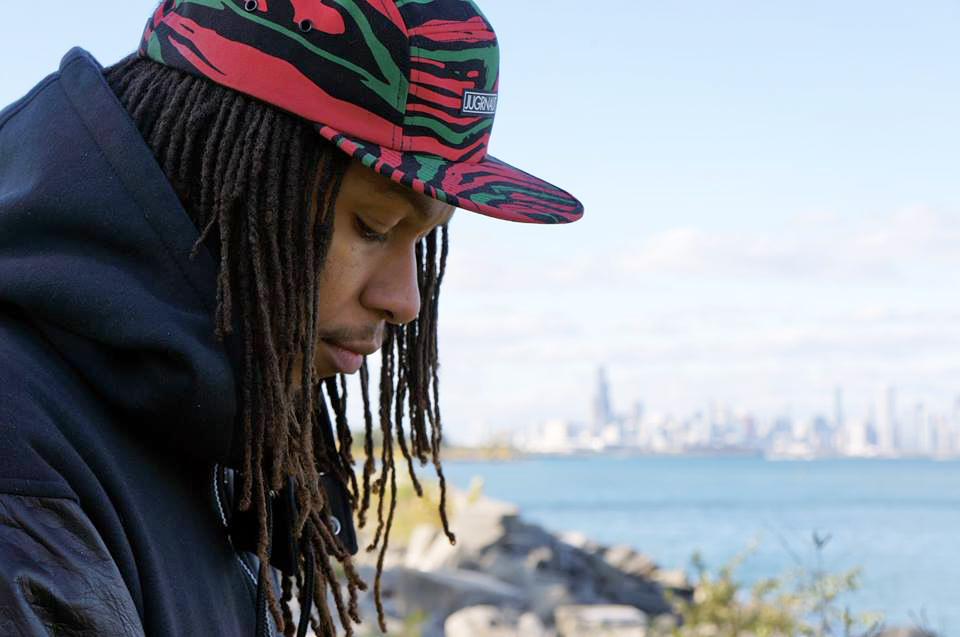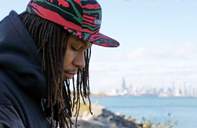
As the son of WVON DJ Vincent Price, Sterling Price—aka Pugs Atomz—was exposed to the business side of radio at an early age, but his path back to the on-air control board followed a circuitous route. As a student at Kenwood Academy, he became interested in graffiti and rap. In 1993, he formed the Nacrobats crew, a massive hip-hop collective which now has over ninety members. Later, while studying painting and video production at the School of the Art Institute of Chicago, Atomz helped form the Chicago hip-hop label Birthwrite Records, which would release the debut album of fellow Englewood resident Psalm One. It was Atomz’s desire to showcase his music and the music of those he cared about that eventually led him back to the airwaves. Along with his co-hosts, Thaione Davis and KMax, Atomz started broadcasting the CTA Radio show on WHPK in 2000. Fourteen years later, Atomz continues to broadcasts his three-hour radio show every Wednesday night at nine.
How did you first start DJing at WHPK?
In terms of DJing, I got started by working with Schur Marketing. I used to deliver records to the different DJs, and over the course of that, they asked, “Do you rap?” And they would let me on the air sometimes to freestyle.
In terms of getting involved with HPK, that was my friend Reyna. She brought me and three of my friends up to HPK for the Saturday night show. It was on one of those random nights where we were all hanging out, and we’re like, “Yo, it’d be nice to get on the radio and freestyle.” And she was like, “Oh, I know the DJ.” She made the call and brought us in. We were all excited. For us and our work and our world, it was our first big look, because we’re on the radio now.
We rapped over this song from Bahamadia, “True Honey Buns.” Flawless. Four dudes, each person came in and out, all improvised. And we were like, “Ah, we’ve made it now.” So between that and doing the marketing I got really acquainted with HPK.
How did CTA Radio get started?
It was started because the guys on Wednesday night—which included this guy Natural who became the DJ for Typical Cats [a hip-hop group that first formed at WHPK]—they were graduating, and were moving back to New York. Somebody needed to take over the show, and they were like, “Would you like to do it?” At that point in time I didn’t really think about doing a radio show, I didn’t even have experience in working the boards or anything.
At the same time, I was becoming cool with this guy Thaione Davis, and he was making mixtapes and we both were starting to rap together with the Nacrobats. From there, I was just kind of like, “Well this is an opportunity. Hey, Thai, I know you know how to do this, why don’t we do this together?” Thaione is one of those people where if he’s a part of anything, he goes a hundred percent.
So we go, and then when I get to the show, I find there’s somebody else that’s gonna compete with us for this spot on Wednesday night: KMax. He was our competition, but in the same breath, him and KMax were friends. I just wanted it; I don’t really want to have to fight for it, argue about it. So I said, “We should all just do it together.” I just didn’t want to lose the show. It was a great opportunity to play music.
At the time, I didn’t really understand the task at hand. It sounds easy in a way: three hours; you play what you want to play. But in the grand scheme, after the first three or four shows, I was like, “I need more variety of music, and also just to listen to more music.” It really broadened my spectrum, and to a point I really felt it made me listen to rap in a deeper way. Seeing how these things go together. Hearing how certain tempos and references from one record will translate well into the next one being played. I began to feel more how my pops and his friends felt listening to jazz.
WHPK is an all-volunteer station. How do you make it work volunteering? Why do you volunteer?
To me, that’s the cool part about it. Because it’s volunteer, you have more freedom to do it how you see fit. Me and Cos and KMax and Thaione, we all used to work for [WPWX] Power 92 in marketing. At a point, I was like, “I should be a radio DJ on here,” and my dad was a commercial radio DJ, and he would always tell me, “You don’t want that job.”
And the more we were working there, I realized it would be cool, but I wouldn’t be able to play the music that I like. And a sense of doing it for the love, you’re more cautious in a way, but you’re also more loose. The way I used to describe our show was that anybody has a chance to come on our show and play their stuff, you just have to meet certain criteria to get to that chance now.
At HPK, so many famous musicians have been through those doors. It’s amazing to think that this is a volunteer station as opposed to a place that’s built-up and super nice. It’s a place that is like college radio stations, half run by the university, half run by [pledges]. And to have everyone from a Kanye West down to get their music heard here…all those key people in rap music now have been through those doors, and that sense of history and necessity. HPK is the first place to ever play rap in Chicago; it’s the foundation. To me, that was a duty. I want to keep that thing going.




Hi , could you please ask Vincent Price if he remembers The Coulter Family on 79n Justine.. thank you.. Rhonda Brown